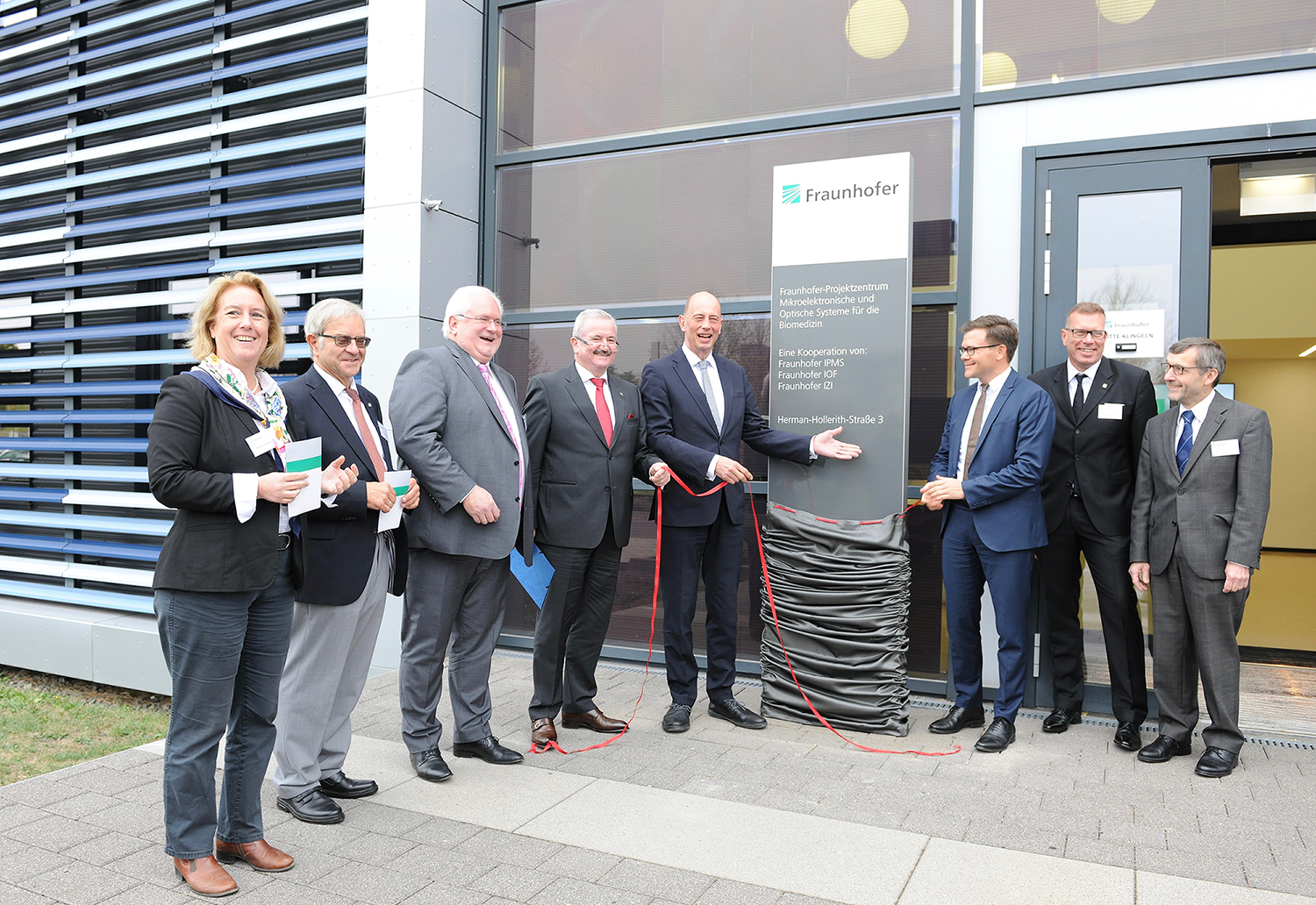New Fraunhofer Project Center "Microelectronic and Optical Systems for Biomedicine" in Erfurt Opens its Doors
On 19 October 2018, the Fraunhofer project center "Microelectronic and Optical Systems for Biomedicine" (MEOS) celebrated its opening in Erfurt, Thuringia, together with top representatives from the fields of politics, science and business. Three Fraunhofer institutes – the Fraunhofer Institute for Photonic Microsystems IPMS, the Fraunhofer Institute for Applied Optics and Precision Engineering IOF and the Fraunhofer Institute for Cell Therapy and Immunology IZI – will conduct joint research projects into new biomedical applications in this area in future, working closely together with business partners.

Erfurt, 19.10.2018. German journalist Ludwig Börne chose his words wisely when he once noted: "There are thousands of diseases, but only one health." It is with good reason that a person’s health is viewed as their greatest asset. Health, demographic change and wellbeing are key social challenges that can only be resolved using interdisciplinary approaches that draw on the close cooperation of various players from business, science and society. The advancement of new biomedical applications and the development of innovative medical engineering solutions also play a role here. The use and continued development of key technologies in areas such as life sciences, microelectronics, optics and photonics are especially important. Hence the opening of the new Fraunhofer project center “Microelectronic and Optical Systems for Biomedicine” (MEOS) in Erfurt on 19 October 2018. Thuringian Minister for Economic Affairs, Science and Digital Society Wolfgang Tiefensee, President of the Fraunhofer-Gesellschaft Professor Reimund Neugebauer, member of the German parliament from Erfurt Carsten Schneider and Chairman of the Steering Committee and Executive Director of Fraunhofer IPMS Professor Hubert Lakner all attended the opening event. Three Fraunhofer institutes - the Fraunhofer Institute for Photonic Microsystems IPMS, the Fraunhofer Institute for Applied Optics and Precision Engineering IOF and the Fraunhofer Institute for Cell Therapy and Immunology IZI - will carry out research into new biomedical applications in this field in future, in close cooperation with business partners. At the opening, attendees even got a first glimpse of the center's future laboratories.
The consolidation of Fraunhofer IPMS, a leading research service provider in the field of microelectronics and microsystem technology, Fraunhofer IOF, a recognized center of competence for optics and photonics, and Fraunhofer IZI, a prominent player in the field of life sciences, brilliantly demonstrates how core competencies should be pooled and exploited in an interdisciplinary manner in future. Key to the success of the project center is also the location in Erfurt, with its research infrastructure, established local companies and connections to the universities in Erfurt, Ilmenau and Jena.
This was underscored by Thuringian Minister for Economic Affairs and Science Wolfgang Tiefensee: "For years now, the Fraunhofer-Gesellschaft has helped point the way for medium-sized businesses in Thuringia. It ensures that research results are swiftly transferred into marketable products and services and thus supports one of the core goals of Thuringia’s innovation policy. With the new project center, the location is being further strengthened at the interface between the state's key industries of optics, medical technology and microelectronics." The state will bear half of the overall costs of the start-up phase ending in 2022, totaling 35 million euros. "Together with all of the players in Erfurt, we will do all we can to make the new center a lasting success for the Fraunhofer-Gesellschaft and the technology hub that is Thuringia."
Fraunhofer President Professor Reimund Neugebauer explained: "The opening of this new Fraunhofer project center shows another side to Fraunhofer’s continued strong presence in the Free State of Thuringia and demonstrates its commitment to this prosperous scientific center. The field of biomedicine poses a scientific challenge that bears significance to society as a whole, which is why it can only be advanced using interdisciplinary approaches. We will therefore pool together the core competencies of three research institutes at the very highest level here in Erfurt in future."
The Fraunhofer project center will initially focus on three specific technology platforms: optical systems for high-resolution microscopy, improved medical imaging and biosensor technologies. Looking ahead, activities may well be expanded to other fields of application.
Professor Hubert Lakner, executive director of Fraunhofer IPMS and chairman of the steering committee for the project center, concluded by saying: "Transferring research and development into industrial technologies and pilot production will be an intrinsic part of the project center from the word go. Here in Erfurt, it will not be long before medical technology, analytics, diagnostics, biotechnology and photonics systems as well as pharma and food economics systems are developed to application maturity and transferred into industry. We look forward to a trusting and fruitful cooperation with industry in Thuringia and beyond."
Start-up funding of 20 million euros split over five years to cover initial scientific projects will be divided equally between the Fraunhofer-Gesellschaft and the Free State of Thuringia. Investments amounting to 15 million euros to develop and equip the new project center are also being split equally. Once this initial funding period has ended, the project center is expected to fall under the federal and state financing received by the Fraunhofer-Gesellschaft.